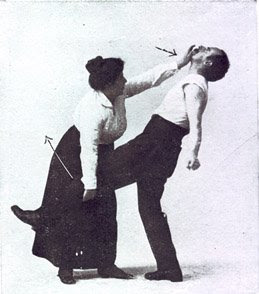Sunday, November 30, 2008
The Flaneur
After hints in the press earlier this year about mysterious vans cruising the city, this morning I noticed that, rather quietly, Google has unveiled their street-view of Paris.
I happened to be looking for a map of Avenue du Maine in Montparnasse, when... I saw it!
View Larger Map
I happened to be looking for a map of Avenue du Maine in Montparnasse, when... I saw it!
View Larger Map
Saturday, November 29, 2008
Book Release of the Damned
A fascinating recent piece on publishing trends from a newspaper in.... the United Arab Emirates.
S'true:
You sort of have to feel for that guy.
S'true:
Karl Marx, according to his German publisher, is enjoying a new-found popularity. Sales of Das Kapital are surging as the global financial crisis inspires people to reassess the capitalist system.... Borders and Barnes and Noble bookstores have repositioned their personal finance sections to the front of the stores, and books such as George Soros’ The New Paradigm for Financial Markets are doing a brisk trade.
...At the other end of the timing spectrum is Amit Chatwani’s Damn, It Feels Good to be a Banker, which was published in August. “I’m hoping that people will look at it as a sort of historical document, a parody of a world that existed until basically a moment after it came out,” Chatwani says.
You sort of have to feel for that guy.
Saturday, November 22, 2008
Stump the Reader

Here's something that I heard about before visiting the University of Padua this summer, and that has fascinated me ever since -- antique wooden books.


Instead of pages, they contain botanical samples of different trees -- for which the covers serve as cross-sections...
Post-It Not
I'm in Slate this week with a piece on the rare but curious phenomenon postmen who hoard mail:


The hoarding and abandonment of mail is a phenomenon that extends at least back to 1874, when Providence, R.I., postman Benjamin Salisbury was caught throwing mail into the ocean "to avoid the trouble of delivery." In 2006, the last year the U.S. Postal Service released figures, there were 515 arrests and 466 convictions for "internal theft"... They've been caught by meter readers, by housesitters feeding a rabbit for a vacationing postman, and by state troopers making traffic stops. "Dead-letter cars"—old clunkers filled up like a junk-mail piñatas—have been discovered by mechanics and used-car dealers. And a number of cases are broken after the stashed mail catches fire: In 1974, back-to-back cases a week apart yielded 1,200 sacks of mail in a Louisville, Ky., attic and another tractor-trailer load in a burning attic in suburban Connecticut.Inevitably, there's a literary angle: William Styron's mail went missing in one case.
Sunday, November 16, 2008
Indeed I Will
Long-promised and finally on the way... The Book of William: How Shakespeare's First Folio Conquered the World is now up for pre-orders on Amazon!
Saturday, November 15, 2008
The End
During the crash of Wall Street, I've kept wondering: what does Michael Lewis make of this? Well, now we know: he's just put an absolutely brilliant piece up at Portfolio.
A passage on the short-sellers who saw the crash coming years ago:
A passage on the short-sellers who saw the crash coming years ago:
“All hell was breaking loose in a way I had never seen in my career,” Moses says. FrontPoint was net short the market, so this total collapse should have given Moses pleasure.... [But] “I spent my morning trying to control all this energy and all this information,” he says, “and I lost control. I looked at the screens. I was staring into the abyss. The end. I felt this shooting pain in my head. I don’t get headaches. At first, I thought I was having an aneurysm.”
Moses stood up, wobbled, then turned to Daniel and said, “I gotta leave. Get out of here. Now.” Daniel thought about calling an ambulance but instead took Moses out for a walk.
Outside it was gorgeous, the blue sky reaching down through the tall buildings and warming the soul. Eisman was at a Goldman Sachs conference for hedge fund managers, raising capital. Moses and Daniel got him on the phone, and he left the conference and met them on the steps of St. Patrick’s Cathedral. “We just sat there,” Moses says. “Watching the people pass.”
This was what they had been waiting for: total collapse. “The investment-banking industry is fucked,” Eisman had told me a few weeks earlier. “These guys are only beginning to understand how fucked they are. It’s like being a Scholastic, prior to Newton. Newton comes along, and one morning you wake up: ‘Holy shit, I’m wrong!’ ” Now Lehman Brothers had vanished, Merrill had surrendered, and Goldman Sachs and Morgan Stanley were just a week away from ceasing to be investment banks. The investment banks were not just fucked; they were extinct.
Not so for hedge fund managers who had seen it coming. “As we sat there, we were weirdly calm,” Moses says. “We felt insulated from the whole market reality. It was an out-of-body experience. We just sat and watched the people pass and talked about what might happen next. How many of these people were going to lose their jobs. Who was going to rent these buildings after all the Wall Street firms collapsed.”
Tea for Tenniel

Via Fine Books, a lovely compilation of book sculptures at the Dark Roasted Blend blog.
This one in particular looks like an anxiety dream I'd have while in the middle of research:

Saturday, November 08, 2008
Bike Kwan Do

Is anything more entertaining than Edwardian martial arts? I think not.
Which brings me to a great Neal Stephenson quote over in The Telegraph:
But for now he's instructing me, over a pint, about longsword-fighting, walking-stick self-defence and an Edwardian martial art that used a bicycle as a weapon.... "Yeah. There's a whole curriculum over fighting with bicycles. Pictures of an Edwardian lady in a floor-length dress and a huge hat with flowers, riding primly down a country lane, and when a ruffian comes out she uses some trick with the bicycle to flatten him and rides off. It's great stuff. The bicycles we're not sure how to approach, but we've created a little assembly line to make rattan canes, with a knob on the end. But there's, you know, how to use a bicycle pump as a weapon. How to defend yourself with a parasol. Crazy."
Searching on "bicycle pump" and "weapon" turns up this utterly wonderful article from 1900 on escaped big game in England in Fores's Sporting Notes:
Although 1898 was so devoid of interest from the elephant shikaris point of view, it was undoubtedly the best season the hunter of the British bear has yet seen. On Lady Day of that year the first bear hunt on bicycles was instituted quite involuntarily by some Shoreditch cyclists, who rode as only Shoreditch cyclists can, at full speed into a herd in the neighbourhood of Leighton Buzzard. One of the riders, during this exciting encounter, was thrown from his saddle, but alighted upon the back of one of the bears — a truly Rougemontal feat — and two others were thrown, but not without rolling over a couple of the ursi.
During the second week in August bear-hunting was very popular in the outlying villages of Colchester, but shopping and walks abroad were decidedly at a discount. The bear in question escaped from its den near Walton-on-the-Naze, and for over a week roamed at large, though any able-bodied man with a gun in his hand thought himself at liberty to indulge in a little stalking.... A cyclist, armed with a bicycle pump only, was more fortunate, and came into camp, evidently greatly alarmed, with the news that he had met the monster on the high road....
Since 1896, in which year there was a splendid hunt at Bedford, the ostrich has not afforded the British sportsman much excitement, but the pursuit of the Bedford ostrich through the streets of that town by a highly talented body of circus employes mounted on horseback... has only once been rivalled, namely at Croydon a couple of years ago, when a boxing kangaroo ran amok through the busiest thoroughfares.
Saturday, November 01, 2008
Joe the Oxford Don
Since plumbers don't seem to be working out so well, the McCain camp has turned to... uh...
If you need philosophy profs to save your presidential campaign, you may be beyond saving.
Dr Peter Millican, a philosophy don at Hertford College, Oxford, has devised a computer software program that can detect when works are by the same author by comparing favourite words and phrases.He was contacted last weekend and offered $10,000 (£6,200) to assess alleged similarities between Obama’s best-seller, Dreams from My Father, and Fugitive Days, a memoir by William Ayers.
Ayers, now a university professor in Chicago, co-founded the Weathermen, a radical 1960s underground group that bombed government buildings in Washington and New York. The Republicans accuse Obama of “palling around” with him.
The offer to Millican to prove that Ayers wrote Obama’s book was made by Robert Fox, a California businessman and brother-in-law of Chris Cannon, a Republican congressman from Utah. He hoped to corroborate a theory advanced by Jack Cashill, an American writer...
Millican took a preliminary look and found the charges “laughably unsubstantiated”. A deal was agreed for more detailed research but when Millican said the results had to be made public, even if no link to Ayers was proved, interest waned.
(from the Times of London)
If you need philosophy profs to save your presidential campaign, you may be beyond saving.
The Election According to Google Books
John McCain: Working the polls for Democrats.
Sarah Palin: Tangled up with haberdashers.
George Bush: "One of the most profound scholars of his day."
Dick Cheney: Prosecuted for illegal lobbying.
Joe the Plumber: Dodging his taxes.
Jeremiah Wright: Busted for taking advantage of the Civil War.
Bill Ayers: A fine kettle of fish he's gotten you into.
Barack Obama and Joe Biden: have no precedent.
Sarah Palin: Tangled up with haberdashers.
George Bush: "One of the most profound scholars of his day."
Dick Cheney: Prosecuted for illegal lobbying.
Joe the Plumber: Dodging his taxes.
Jeremiah Wright: Busted for taking advantage of the Civil War.
Bill Ayers: A fine kettle of fish he's gotten you into.
Barack Obama and Joe Biden: have no precedent.
Muffins, My Friends
Great catch by Paul Constant over at The Stranger:
McCain talked about other books he admires, contradicting his own, oft-recorded preference for Hemingway: "War and Remembrance and Winds of War are my two absolute favorite books... War and Remembrance for me, it's the whole thing." Goldberg asks, "Not a big Philip Roth fan?" And McCain curtly responds, "No, I'm not. Leon Uris I enjoyed."
...There's one particularly relevant Leon Uris book: his twelfth novel, titled A God in Ruins. Published in 1999, just as McCain's presidential ambitions were made public for the first time, Ruins tells the story of a presidential race in 2008. The hero is Quinn Patrick O'Connell, an ex-military man from Colorado who is running for president but has discovered a shameful secret: He is actually Jewish. Like all speculative fiction that's reached the date it imagines, the idea of a candidate's Jewishness being a problem is almost laughable now, but even without the central engine of the plot to concern us, there's still much to learn.
Certainly Uris's writing—"She smiled, and her eyes were big brown muffins"—can't compare to Hemingway's lean introspection....